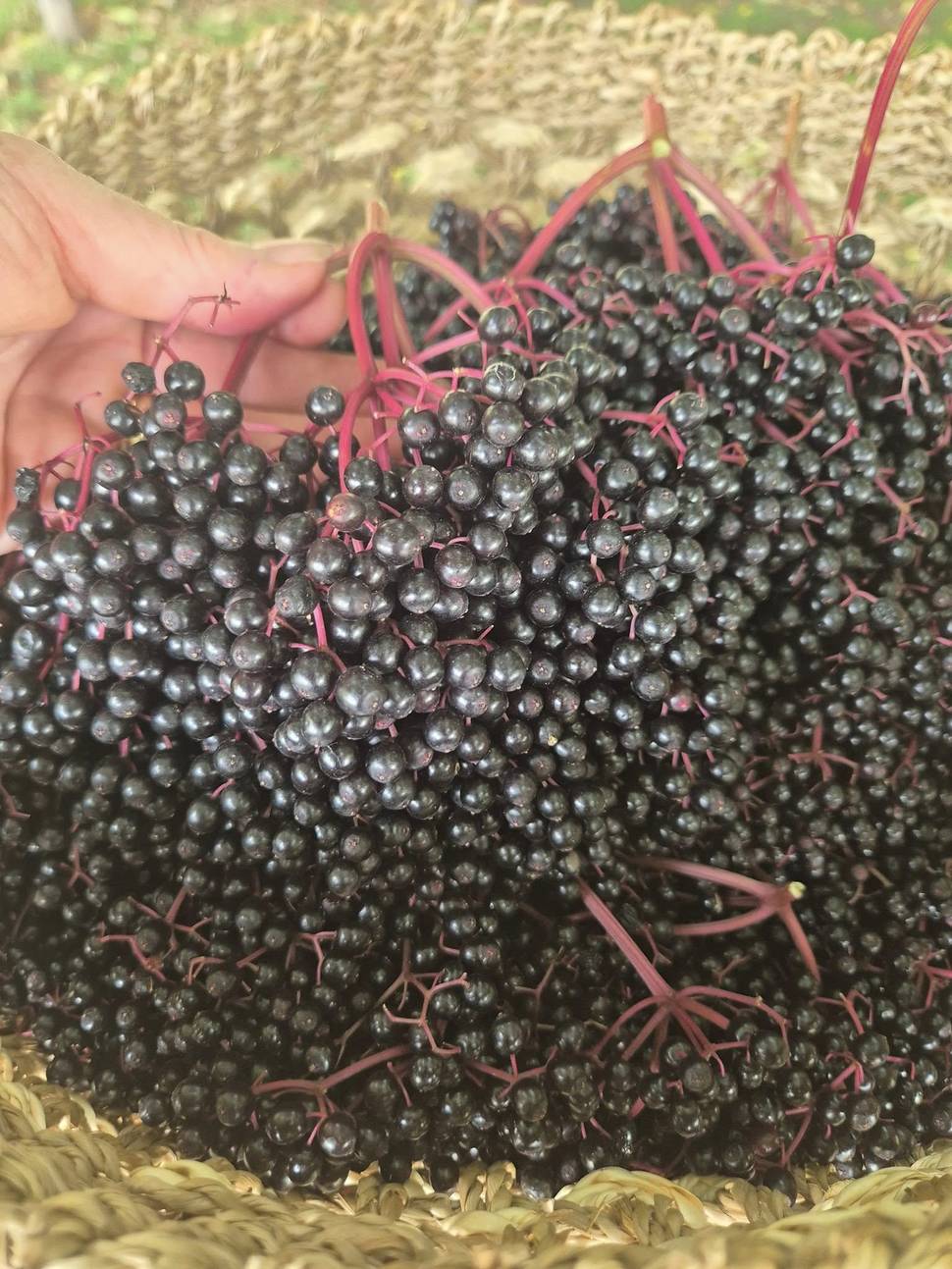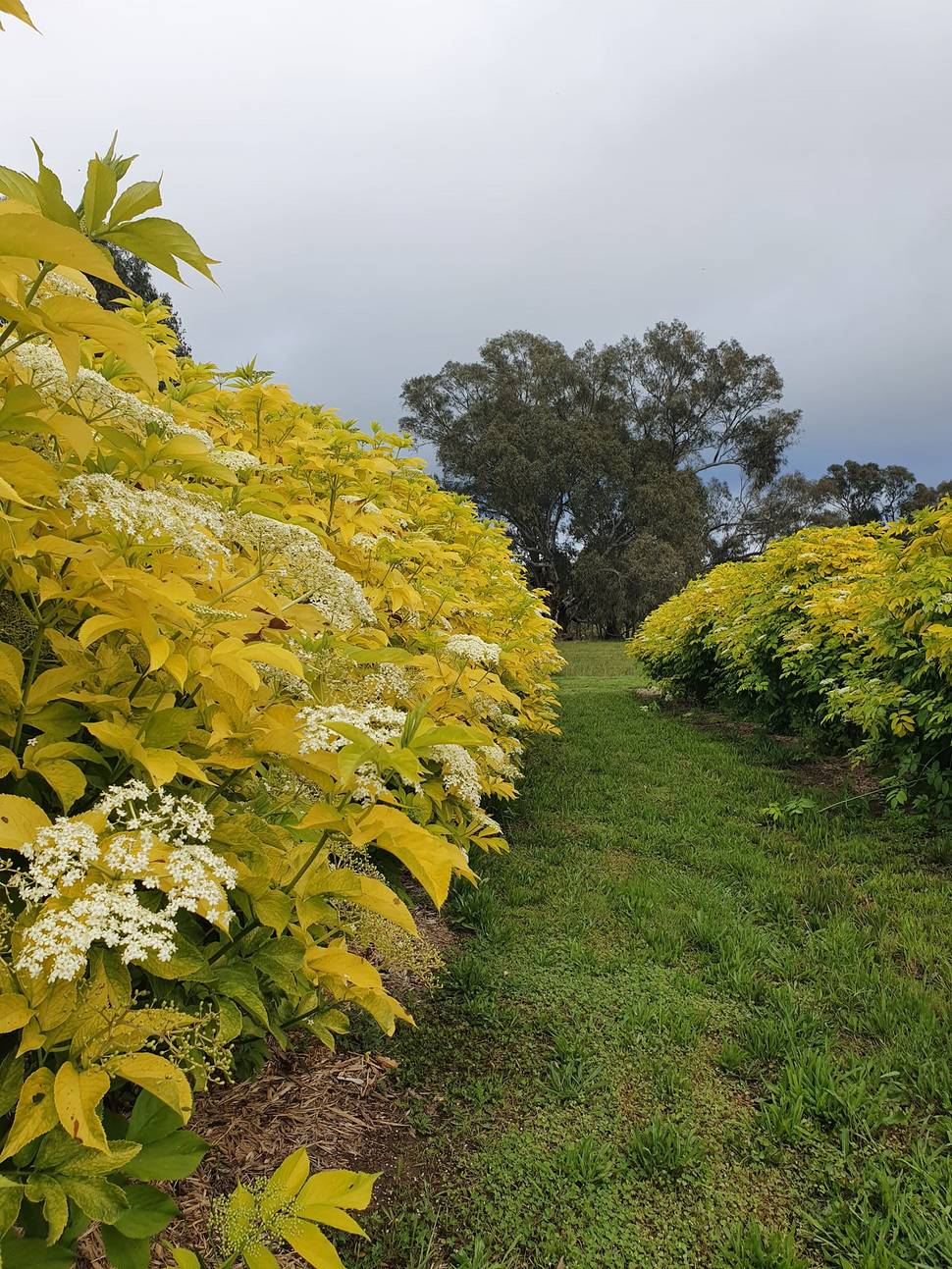“Nature’s medicine chest for the common people”- Hippocrates
All about elderberries
Elderberries are the fruit and flowers of the Sambucus plant, a group of shrubs that have been valued for centuries for their versatility and traditional use across food, drink and seasonal wellbeing.
Both berries and flowers are used in a wide variety of ways from syrups, cordials and cooking to gentle every day products designed for personal and skincare or to support wellbeing and enjoyment. How elderberries are grown, selected and used plays an important role in their quality, flavour, and suitability for different purposes.
At Elderglen, our approach to elderberries is grounded in understanding of the plant itself, its species, growing characteristics and the context in which it is grown. This knowledge informs how we farm, how we develop our products and how we support a thoughtful and sustainable future for elderberries in Australia.
The sections below explore the different elderberry species, their growing context and the broader factors that shape how elderberries are used and understood.
Cultivars and Growing Differences
While elderberries are often spoken about as a single plant, both Sambucus nigra and Sambucus canadensis include a wide range of cultivars that differ in their growth habit, flowering and fruiting timing, yield potential, and suitability to different climates.
Overseas, elderberries are commonly grown using named cultivars selected for specific traits such as productivity, flavour, or pest resilience or drought resilience to local conditions. These selections help growers match plants to their environment and intended use, whether for flowers, berries, or both.
Different species and cultivars can also respond differently to pruning and management approaches, depending on how and when they produce fruit. These differences are an important consideration in commercial growing systems, particularly when aiming for consistent yield and plant health over time.
A Note on Elderberries in Australia
In Australia, access to commercially proven elderberry cultivars is currently limited. Many elderberry plants available locally have been introduced primarily as ornamental varieties, rather than selections developed for reliable fruit or flower production.
This presents challenges for growers seeking consistency, resilience, and long-term viability — particularly in a changing climate.
At Elderglen, we are actively working with universities and international partners to help address this gap. Our focus is on contributing to research, trialling, and knowledge-sharing aimed at identifying elderberry cultivars better suited to Australian growing conditions, including traits such as climate adaptability and resilience.
This work forms part of our broader commitment to supporting the development of a sustainable and commercially viable elderberry industry in Australia, benefiting not only our own farm, but future growers and communities over time.
Elder’s Unique Benefits
Traditionally used for its bark, leaves, flowers and berries Sambucus (Elder) has been nicknamed “Elder Queen” and “Good mother” and has been known for its healing powers in Celtic, Scandinavian and Native American mythology for many centuries. In the Middle Ages elderberry was considered a Holy Tree, capable of restoring good health, keeping good health, and as an aid to longevity.
Elderflower
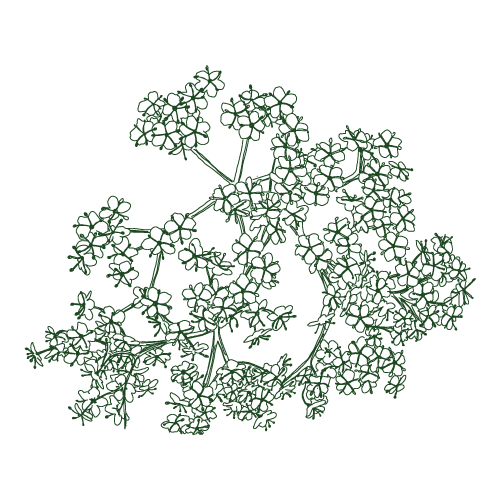
Used for hundreds of years. Studies have shown that elderflowers have great properties for springtime allergies, supporting the respiratory system and the health of skin – with no confirmed drug interaction.
We believe that elderflower are a great healthy addition to food and skin care.
Beneficial components of elderflower
- Abundant in flavonoids – anti-viral
- Rich in bioflavonoids – anti-oxidant, anti-inflammatory and anti-bacterial
- Rich in chlorogenic acids – which may help with allergies, regulating blood glucose levels and have a slight laxative effect
Actions
- Astringent – causes contraction of tissues, primarily the skin
- Demulcent – soothes inflammation or irritation
- Diaphoretic – induces sweating
- Emollient – increases skin hydration by reducing evaporation
- Expectorants – aids in expelling mucus from the airways
Elderflowers may support the body to be less reactive to irritants and may support the clearance of sinuses.
Side Effects
- Elderflowers seem to have few risks when taken daily for five days.
- Elderberry is not recommended for pregnant or breastfeeding women or children under the age of 1.
- Risks – NEVER eat any RAW elderberries, flowers or leaves. They contain a chemical which produces cyanide which are not present after the berries are cooked. Raw berries can cause nausea and vomiting, at high doses more serious effects such as weakness, dizziness and numbness.
- Interactions – if you take any drugs, or supplements on a regular basis or an auto-immune disease, talk to your doctor before taking elderflower.
Disclaimer: This information has been sourced from elderberry monographs which are detailed specialist studies of the plant. Elderglen makes no claims to diagnose, treat, prevent, mitigate or cure diseases with any advice, information, or product(s). None of this information should be misconstrued as medical advice. The ultimate responsibility for your choices and their effect(s) on your health are yours.
Elderberries
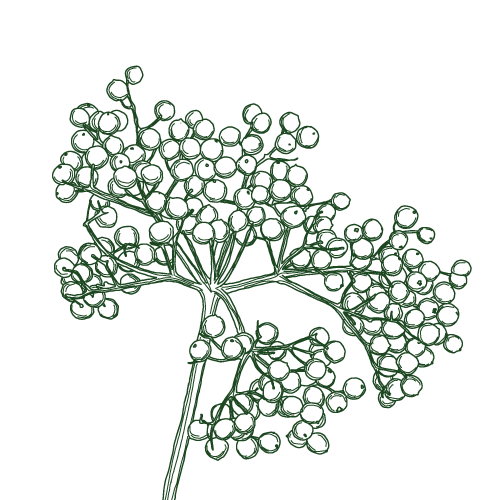
Used for hundreds of years. Studies have shown – Phytochemicals from elderberry stimulate the immune system which may reduce the duration and reduce severity of cold and flu symptoms – with no confirmed drug interaction.
We believe that elderberries are a great healthy addition to food to support immune health.
Beneficial components of elderberries
- High in Vitamin C – antimicrobial
- High in dietary fibre
- Rich in phenolic acids – powerful antioxidants
- Good source of flavonoids – antiviral
- Rich in anthocyanins – antioxidant and anti-inflammatory
Actions
- Alterative – supports the body in its natural cleansing process
- Aperient – eases constipation
- Demulcent – soothes inflammation or irritation
- Diuretic – promotes urination
- Febrifuge – may bring down a fever
- Laxative – loosens stools and promotes bowel movements
Nutritional Value
One cup of elderberries contains 106 calories and 26.6 grams of carbohydrates. It also contains the following vitamins and minerals:
- 870mg Vitamin A
- 406mg Potassium
- 52.2mg Vitamin C
- 9mg Folate
- 2.32mg Iron
- Antioxidants – greater than blueberry, noni, goji and cranberry
Side Effects
- Elderberry seems to have few risks when taken daily for five days. Elderberry is not recommended for pregnant or breastfeeding women or children under the age of 1.
- Risks – NEVER eat any RAW elderberries, flowers or leaves. They contain a chemical which produces cyanide which are not present after the berries are cooked. Raw berries can cause nausea and vomiting, at high doses more serious effects such as weakness, dizziness and numbness.
- Interactions – If you take any drugs, or supplements on a regular basis or have an auto-immune condition, talk to your doctor before taking elderberry
Disclaimer: This information has been sourced from elderberry monographs which are detailed specialist studies of the plant. Elderglen makes no claims to diagnose, treat, prevent, mitigate or cure diseases with any advice, information, or product(s). None of this information should be misconstrued as medical advice. The ultimate responsibility for your choices and their effect(s) on your health are yours.
Elder Leaf
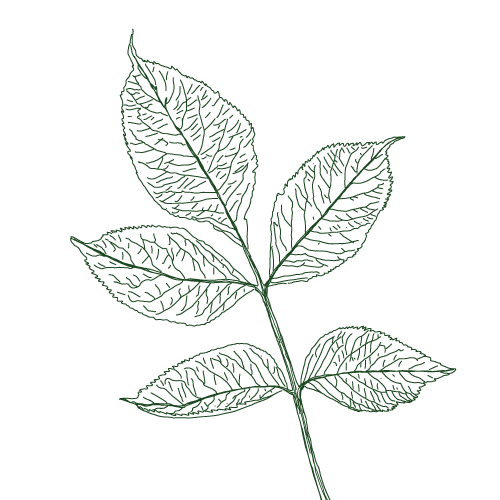
Used for hundreds of years elder leaf has been used for its valuable properties as a natural support.
Elder leaf has also been used to deter pests such as flies and other insects in the vegetable garden.
Actions
- Demulcent – soothes inflammation or irritation
- Astringent – contraction of skin cells
- Analgesic – anti-inflammatory, acting to relieve pain
- Spasmolytic – relieve spasm and soothe muscle
Risks
Elder leaves should NEVER be ingested! They contain a chemical which produces cyanide which cause nausea and vomiting, at high doses more serious effects such as weakness, dizziness and numbness.
Disclaimer: This information has been sourced from elderberry monographs which are detailed specialist studies of the plant. Elderglen makes no claims to diagnose, treat, prevent, mitigate or cure diseases with any advice, information, or product(s). None of this information should be misconstrued as medical advice. The ultimate responsibility for your choices and their effect(s) on your health are yours.
Our Other Ingredients

Apple Cider Vinegar
You may have heard that drinking apple cider vinegar is good for you, but for it to truly be healthy, it needs to contain the mother. Apple cider vinegar that is unpasteurized and unfiltered contains the mother is full of beneficial enzymes and probiotics.
Enzymes – Create chemical reactions in the body to help support life, these include building muscle, destroying toxins, and breaking down food particles during digestion.
Probiotics – strengthen your immune system. They improve your digestive health, creating a healthy balance between the good and bad bacteria inside you.
Elderglen obtains their apple cider from Harcourt (Bakers Creek)

Honey and Beeswax
Honey has been used as folk law remedy throughout history as a variety of health benefits and medical uses.
Antioxidants – help to protect the body from cell damage due to free radicals.
Antibacterial and antifungal – can boost healing time and reduce infection.
Phytonutrients – help to boost the immune system
Beeswax is also known to have anti-inflammatory, anti-bacterial and anti-viral properties. These qualities offer the perfect balance of nourishment to calm the skin, keep it clear and bacteria free, heal wounds and fight infection.
Elderglen obtains their honey from True Blue Honey Beechworth
Research
Hippocrates, father of modern medicine praised elderberries because of their varied beneficial uses. From that point forward elder has been noted in herbals and pharmacopeia. With the growing focus on elderberry today’s science backs up yesteryear’s folklore.
Packed with vitamins, iron, potassium, and powerful antioxidants called anthocyanins, elderberries are traditionally known to be good for your health and immunity.
Recently elderberry has gained popularity with scientists and consumers due to its antioxidant, antimicrobial and immune modulating properties.
We think elder has incredible benefits and encourage you not to just take our word… We encourage you to do your own research to find out just how awesome elderberries can be a great addtion for your health and wellbeing.
Useful Links
National Library of Medicine- USA
Double Blind Placebo controlled clinical trial
Science Direct – advanced research on the antioxidant and health benefit of elderberry
Elderberry for the prevention and treatment of viral respiratory illness – a systematic review
Elderberry research and production Missouri
Food Facts – What are Elderberries Good For?
Elderberry juice may help mental functioning in older adults
References
1. Vlachojannis JE, Cameron M, Chrubasik S. A systematic review on the sambuci fructus effect and efficacy profile. Phytotherapy Res. 2010; 24: 1-8
2. Barak V, Halperin T, Kalickman I. The effect of sambucol, a black elderberry-based natural product on production of human cytokines: 1. Inflammatory cytokines. European Cytokine Network. 2001; 12 (2): 290-6
3. Kong F. Pilot clinical study on a proprietary elderberry extract: efficacy in addressing influenza symptoms. Online Journal of Pharmacology and Pharmacokinetics. 2009; 5:32-43
4. Tiralongo E, Wee SS, Lea RA. Elderberry supplementation reduces cold duration and symptoms in air-travellers: a randomized, double-blind placebo-controlled clinical trial. Nutrients. 2016; 8 (4): 182


